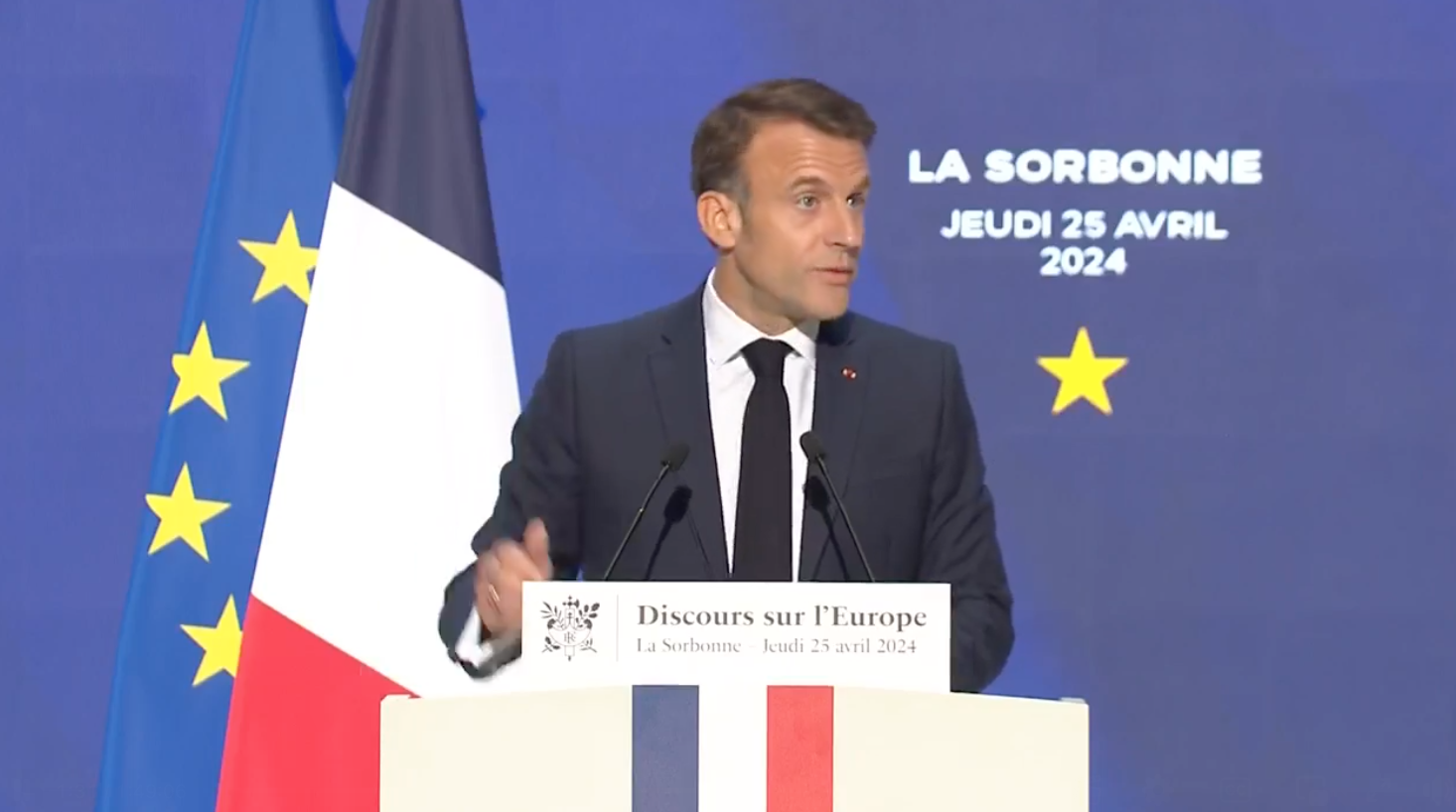Because in Germany Macron’s theses do not inspire enthusiasm

What politicians and newspapers in Germany say after Macron's speech on the economy, industry and defence
It is the economic and financial chapters of the speech on Europe delivered by Emmanuel Macron at the Sorbonne that catalyze the attention of the German press. It is the Handelsblatt that dedicates two comments to the proposals launched by the French president to – Trumpianly speaking – make Europe great again.
At the center is the role of the European Central Bank. “If Macron manages to succeed, the European Central Bank will be faced with a paradigm shift, and will not have to focus its monetary policy only on fighting inflation,” begins the business daily. Macron is pushing for a new mandate for the central bank that includes price stability, growth and climate protection as monetary policy objectives – notes the Handelsblatt – while EU treaties currently stipulate that the Central Bank has the primary obligation to defend price stability, a role similar to that of the Bundesbank before the introduction of the euro.
In Macron's proposal, the ECB should support the general economic policy of the EU where this is possible, without compromising its main objective, a bit like the Federal Reserve does in the United States, which already pursues a dual objective: in addition to the stability of prices, the Fed has the task of promoting full employment, even if its monetary policy mandate lacks the task of promoting climate protection.
Reforms which, writes the Düsseldorf newspaper, found immediate and not surprising opposition in the German political world. “The weakening of the ECB's mandate is absolutely not one of the ideas that is worth discussing,” cut short a senior official from the Ministry of Finance, cited by the Handelsblatt as an anonymous source, the ministry led by the liberal democrat Christian Lindner, the tutelary deity within the Scholz government of the traditional bag of ideas of the Bundesbank, of the debt brake and who has just strengthened the "frugal" profile of his party (in crisis of consensus) by approving a 12-point document which resumes and updates the agenda economy that was by Wolfgang Schäuble.
“The lesson of the most recent phase of inflation is that the ECB must dedicate itself centrally to the mandate of monetary stability”, is the voice coming from the corridors of Lindner's ministry, “growth and climate protection are the tasks of reform-oriented governments , not of the independent Central Bank”.
But the Frisian horses are also being deployed by the Social Democrats. Nils Schmid, spokesperson for the SPD parliamentary group for foreign policy, believes an expansion of the central bank's mandate is unrealistic. In his opinion, Macron is reviving "old debates". And if the Social Democrats appear cold, let alone on the side of the opposition conservative parties, CDU and CSU. “The ECB's objective of price stability must not be compromised under any circumstances,” Markus Ferber, spokesperson for the EPP's economic policy in the European Parliament and politician of the Bavarian CSU, also told the Handelsblatt . If the ECB were also to be responsible for protecting the climate and promoting growth, there would inevitably be conflicting and unsolvable objectives, Ferber added, before concluding: “If Macron gets his demands, the high inflation rates of recent years will become the new normality and the euro will be a weak currency”.
Even on the banking front the reactions are of the same tone. The Bundesbank did not want to officially comment on Macron's speech, and the European Central Bank did the same from Frankfurt, but the Düsseldorf newspaper reports some voices from the corridors of Buba, where it warns of an inevitable overload: the mandate price stability is already an extremely important task for the ECB, the economy and climate protection are issues that concern politicians and their elected representatives.
Other aspects of Macron's European political speech were instead received with greater benevolence in Berlin. That of Europe's drive for greater independence, economic strength and security, for example. This was directly addressed by Olaf Scholz, who commented on the statements of the French president on the social media platform this goal,” the chancellor wrote.
And yet, again in the Handelsblatt , it observes that even that part of the positive reactions from German politicians to this as well as Macron's previous interventions on Europe ultimately remain mere superficial declarations. “In Germany, Macron's visions are not always taken seriously. The French president is labeled as a geopolitical braggart who prefers big words instead of facts", comments the business daily in a second editorial, "but his analysis is closer to reality than that of the federal government, which still does not want to realize of how much the future of Europe and therefore that of one's own country is at stake at this moment."
Faced with the push towards a common defense, Berlin remains militarily hesitant, clinging to the hope that the United States will remain the guarantor of security policy. The attitude towards China remains at least carefree, "the main concern remains not to upset an important trading partner and Berlin likes to ignore the People's Republic's desire for power". And even “Germany's fundamental faith in a fair global trading system and its ardent commitment to multilateralism prove naïve.”
The Handelsblatt 's conclusion is clear, if full of resignation: “Not all of Macron's plans for a strong Europe have been well thought out. A reform of European monetary policy with an expansion of the ECB's mandate to include growth and climate objectives would create more problems than solutions. But the president has clearly recognized the challenges of the twenty-first century and is willing to draw the consequences. Berlin lacks a comparable level of ambition."
This is a machine translation from Italian language of a post published on Start Magazine at the URL https://www.startmag.it/mondo/perche-in-germania-le-tesi-di-macron-non-entusiasmano/ on Fri, 26 Apr 2024 11:01:02 +0000.
